MercoPress. South Atlantic News Agency
Tag: albatross
-
Tuesday, February 20th 2024 - 07:18 UTC
Positive avian flu confirmed in wandering albatross in South Georgia
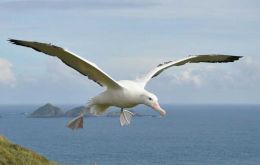
Highly Pathogenic Avian Influenza (HPAI) continues to affect the wildlife on the sub-antarctic islands of South Georgia. The latest results from samples taken from the islands reveal that the disease has now been detected in the wandering albatross (as at 9 February 2024).
-
Tuesday, January 30th 2024 - 10:41 UTC
Survey in Falklands' small islands shows avian flu is continues to threaten
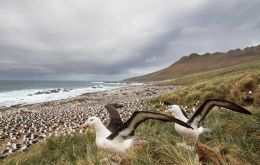
Following on the Falkland Islands Natural Resources Department update on confirmed avian influenza (bird flu) case – Steeple Jason Island, northwest of the archipelago, it has been reported that Falklands Conservation carried out a surveillance visit in January 2024 and found dead albatross chicks in their thousands as well as low levels of rockhopper and skua mortalities. A further set of several more swabs were collected.
-
Tuesday, November 29th 2022 - 10:37 UTC
By-catch scientific research identifies danger areas for wandering albatrosses
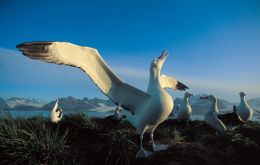
Over half of wandering albatrosses breeding on Bird Island, South Georgia, in the sub-Antarctic, encounter fishing vessels when feeding, putting them at risk of being accidentally caught or killed in fishing gear, according to new research led by British Antarctic Survey and Birdlife International. The results will help conservation efforts for a species that is in decline.
-
Thursday, August 18th 2022 - 08:33 UTC
South Georgia charters “Vinson of Antarctica” to support Albatross Survey
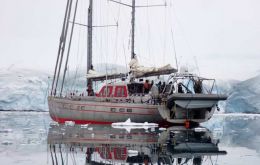
Following a thorough tendering process, the Government of South Georgia has announced that the vessel Vinson of Antarctica has been selected to support a wandering albatross survey planned for 2024.
-
Saturday, August 13th 2022 - 09:43 UTC
Falklands first look at over 30 years of seabird monitoring results
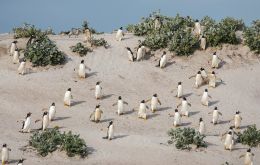
The Falkland Islands are frequently associated with globally significant seabird populations. Indeed, the inshore waters of the Islands have not long been designated as a Key Biodiversity Area (KBA) for this very reason. Understandably stated as a reason for national pride, tourism, conservation and research benefits,
-
Thursday, June 30th 2022 - 09:00 UTC
South Georgia: Yacht Charter to support wandering albatross surveys
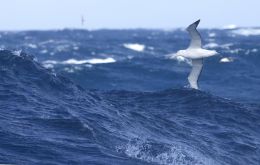
In 2024, the Government of South Georgia & the South Sandwich Islands (GSGSSI) will be undertaking a census of wandering albatross on South Georgia alongside various complementary terrestrial monitoring activities. To support this, GSGSSI requires to charter a yacht. We invite operators to tender for the provision of this service.
-
Wednesday, January 26th 2022 - 09:20 UTC
Spatial Segregation of Seabirds at South Georgia
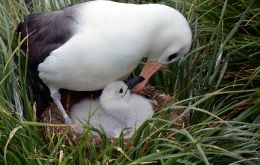
The latest edition of the South Georgia Newsletter refers to seabirds, which are amongst the most globally threatened birds, often as a consequence of incidental mortality (bycatch) in fisheries. At South Georgia, wandering albatrosses have declined since the 1970s, and are listed by the Agreement on the Conservation of Albatrosses and Petrels (ACAP) as one of nine global High-Priority populations for conservation.
-
Thursday, November 25th 2021 - 09:52 UTC
Research done in Falklands shows albatrosses are “divorcing” because of climate change
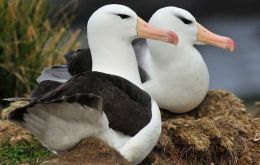
A recent Royal Society study shows climate change and rising oceans are pushing black-browed albatross breakup rates higher. Among the world's most devoted monogamous species, they are “divorcing” more frequently. For 15 years, researchers studied a wild population of 15,500 breeding couples in the Falkland Islands, and in effect, only 1 to 3% of couples would separate after picking a partner to pursue more romantic pastures.
-
Saturday, June 5th 2021 - 09:51 UTC
Over £8m boost for international conservation in UK Overseas Territories
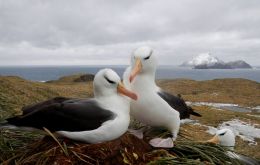
Over £8 million new funding to protect rare wildlife and vulnerable habitats across the globe. Threatened species such as whales, marine turtles and sharks will be better-protected thanks to a boost of over £8 million for projects in the UK Overseas Territories, the British government announced on Saturday 5 June under plans to tackle the global biodiversity crisis.
-
Thursday, April 30th 2020 - 07:55 UTC
Plastic pollution continues to reach sub-Antarctic islands
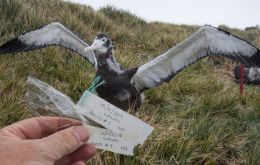
Food wrapping, fishing gear and plastic waste continue to reach the Antarctic. Two new studies into how plastic debris is reaching sub-Antarctic islands are published in the journal Environment International.
